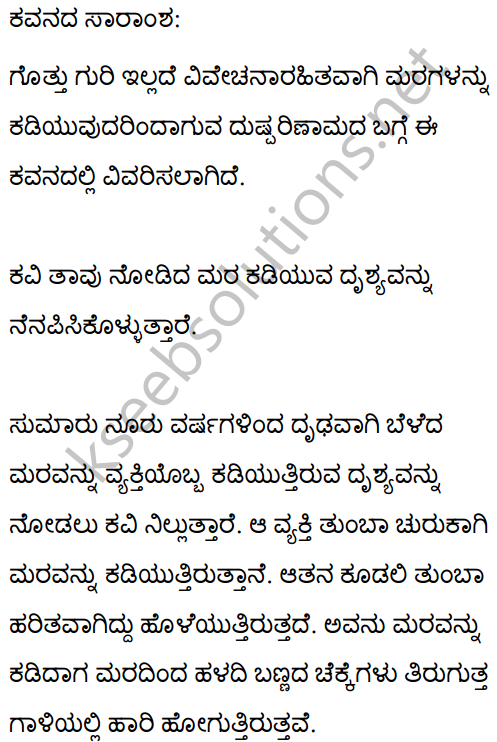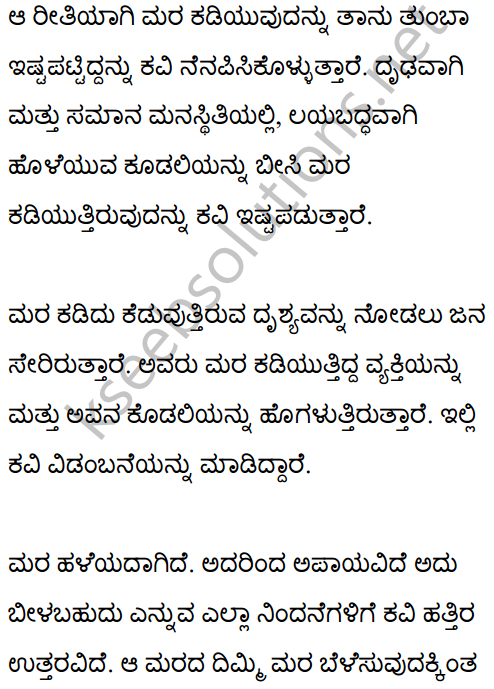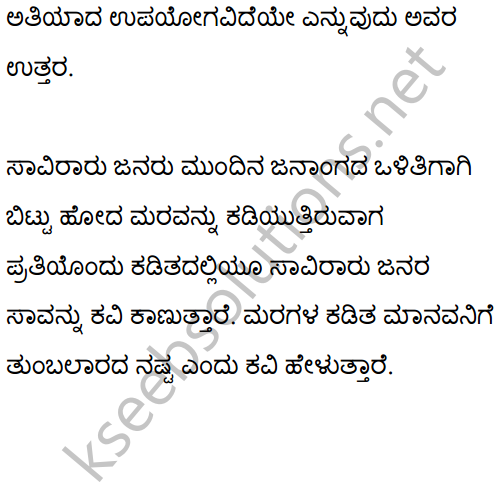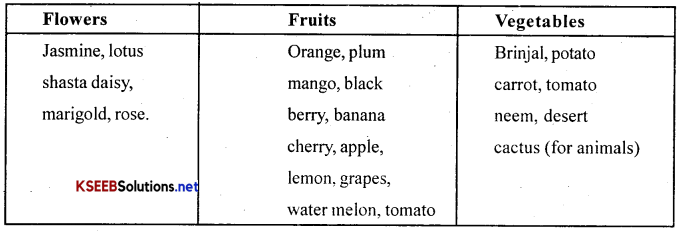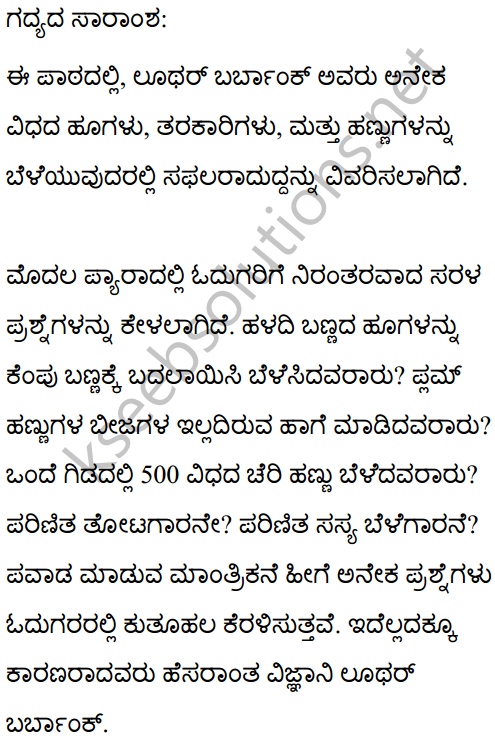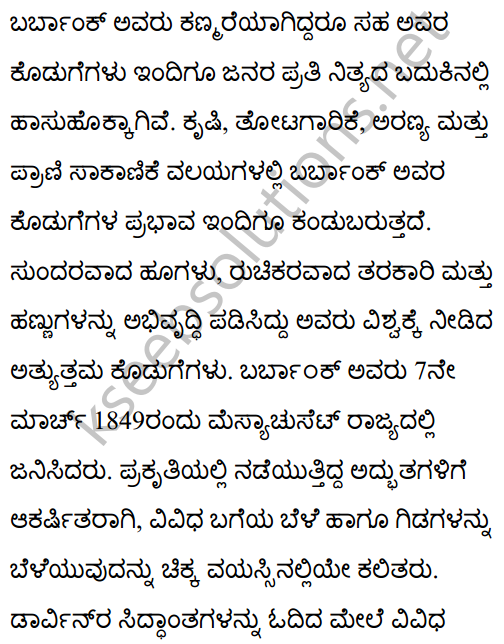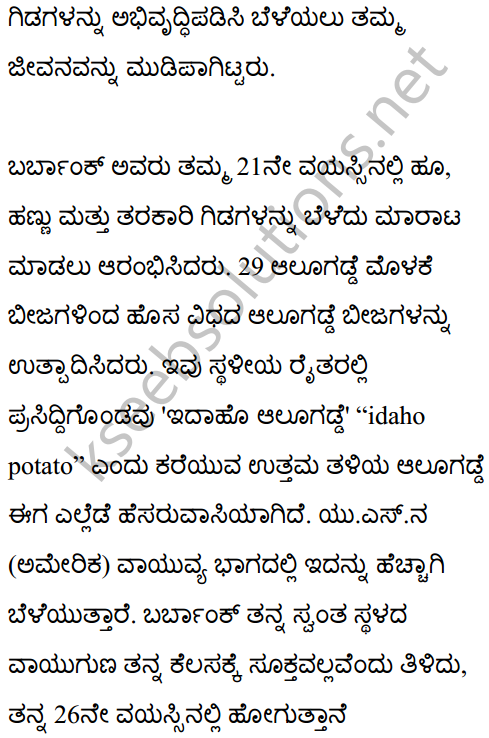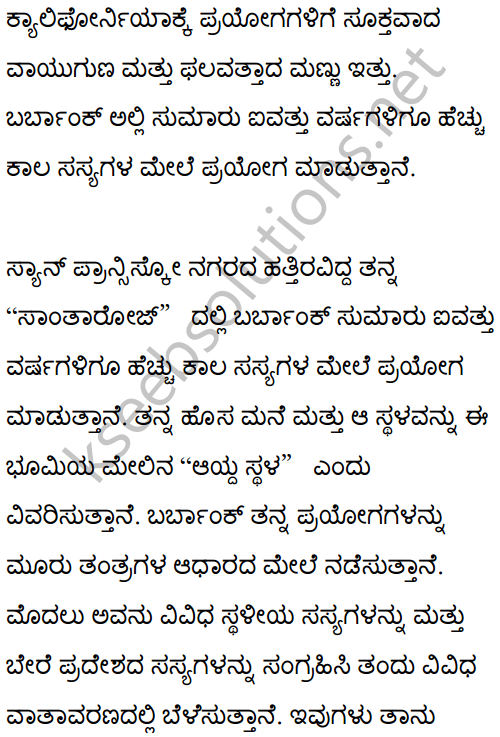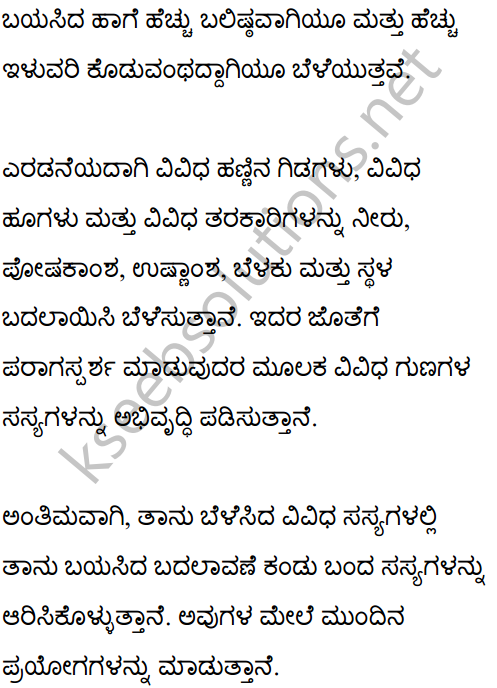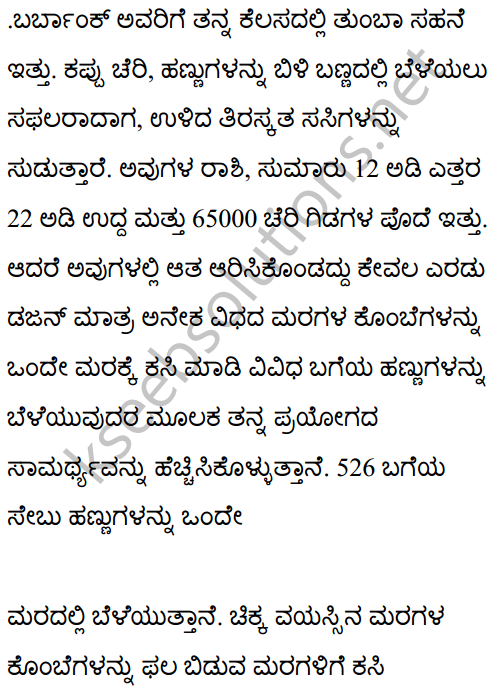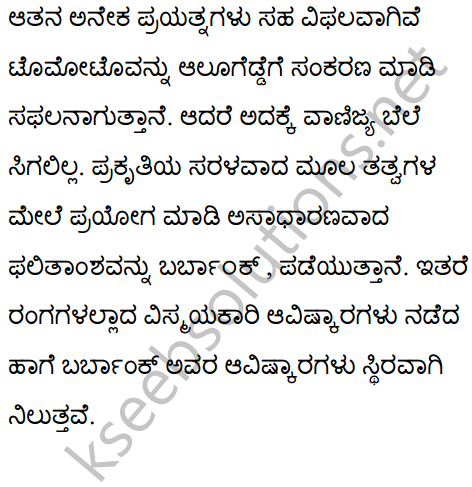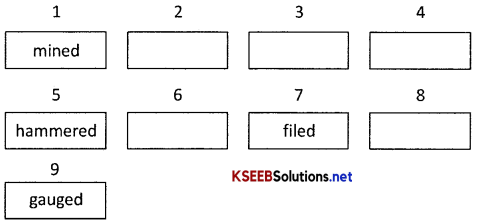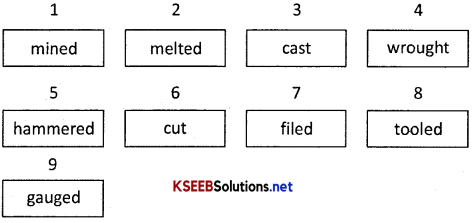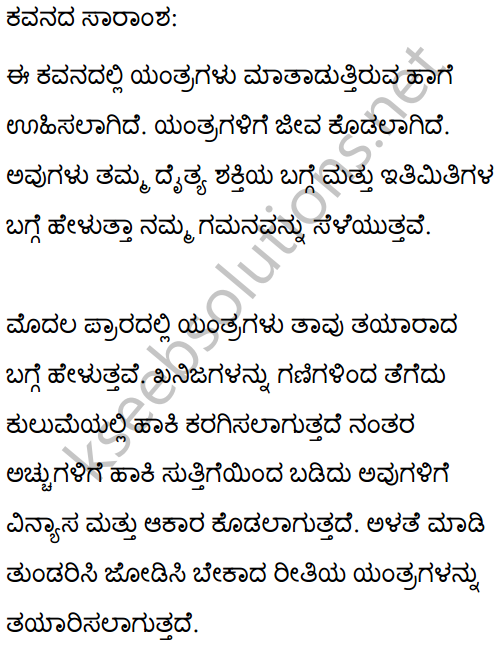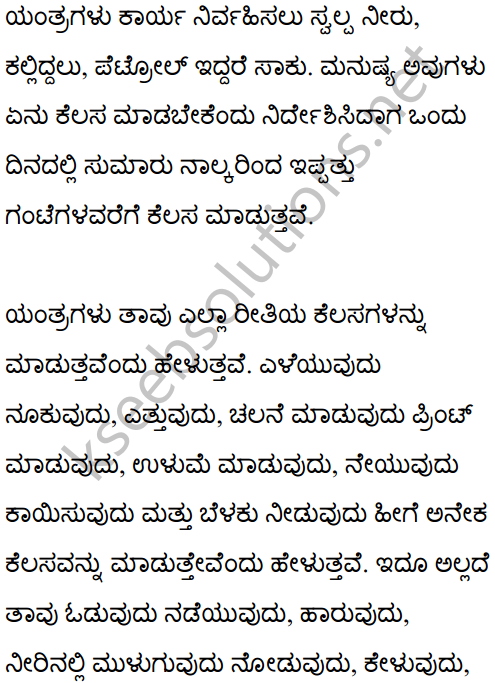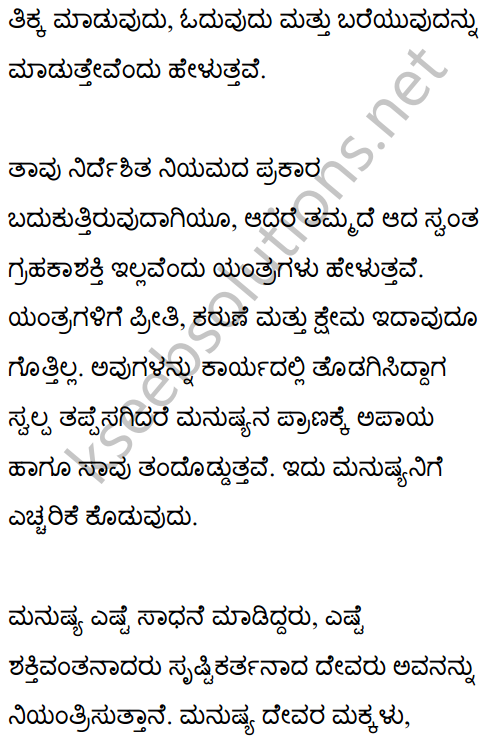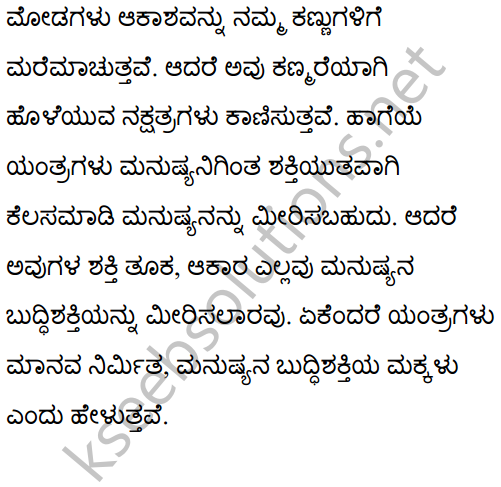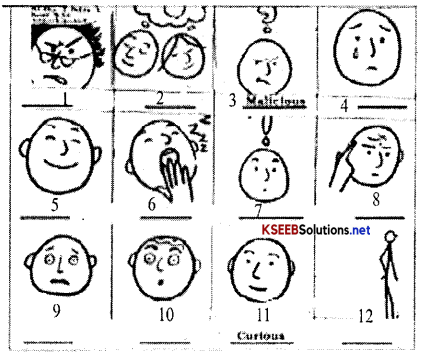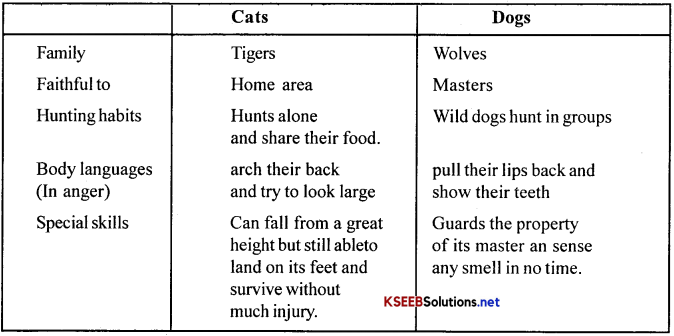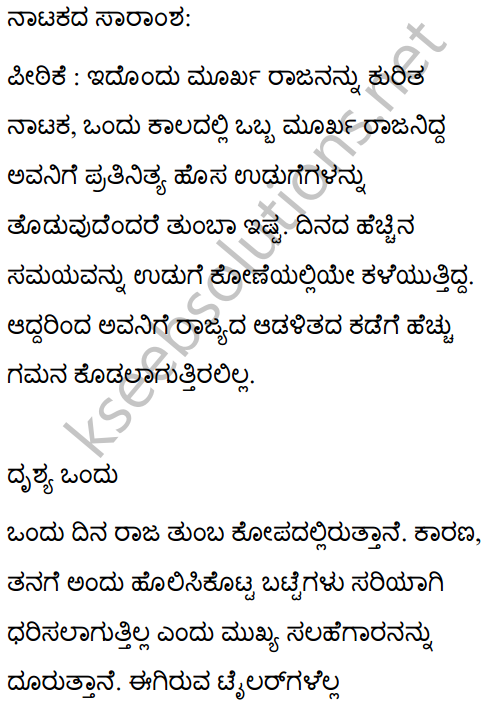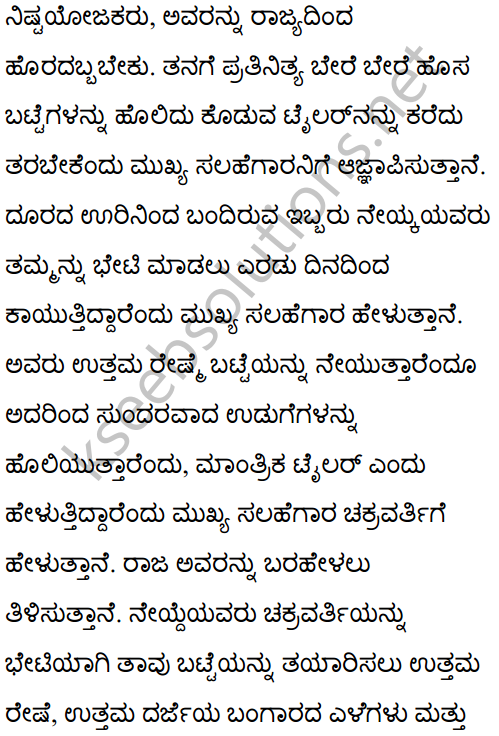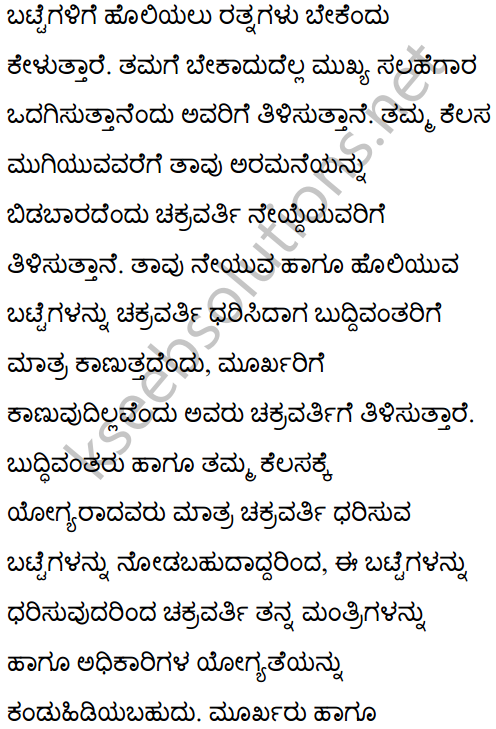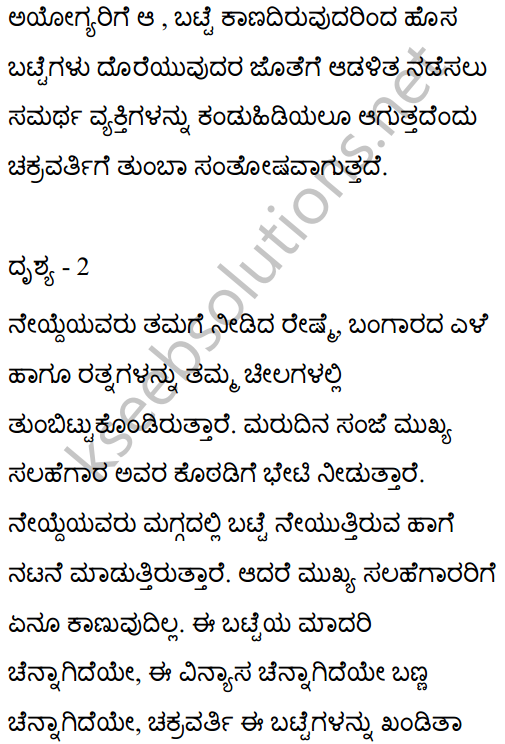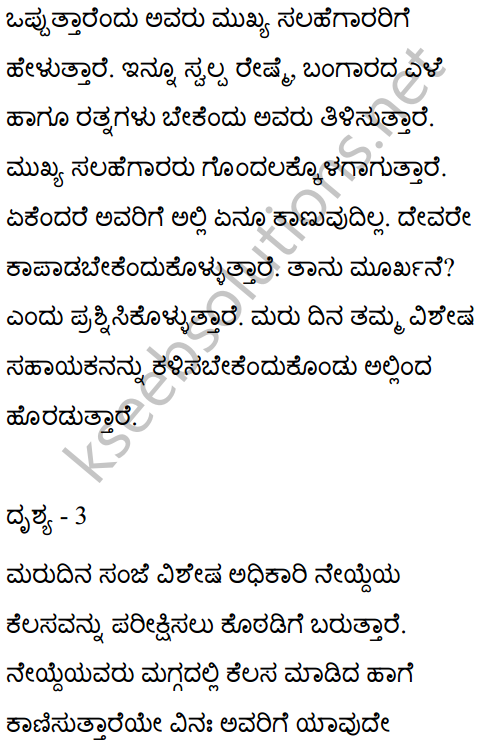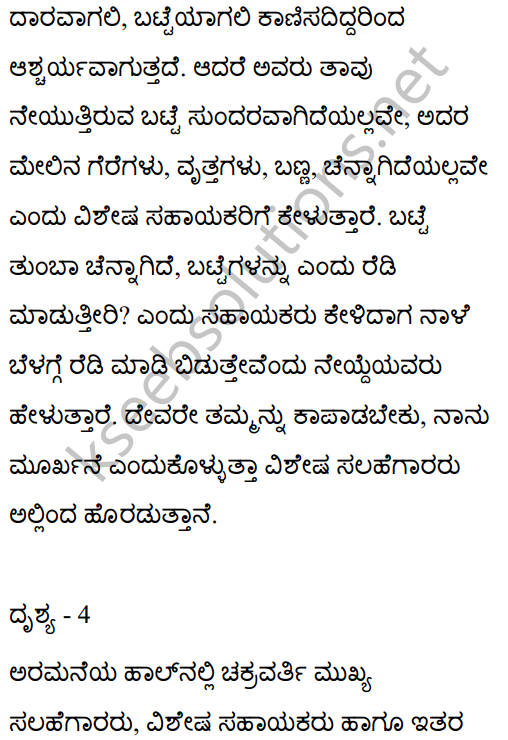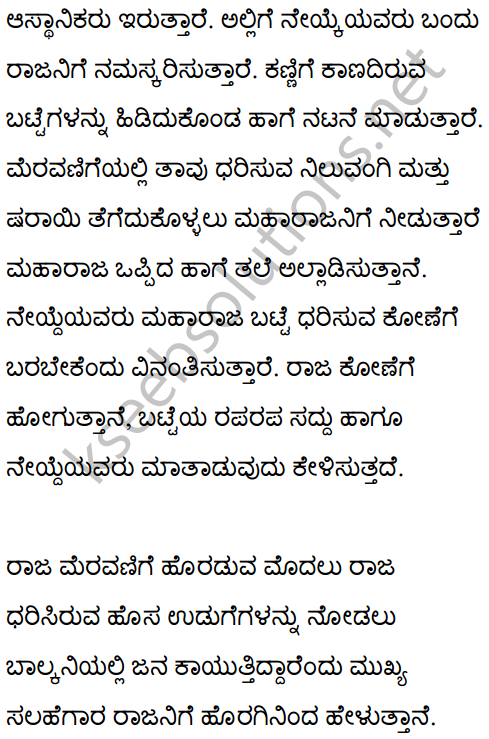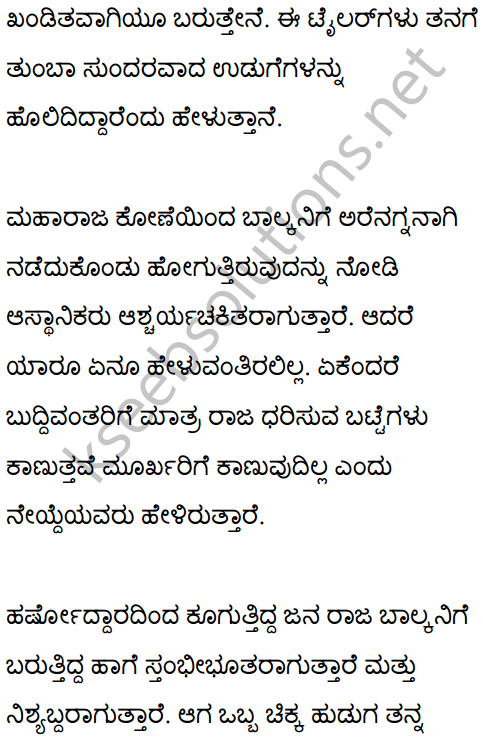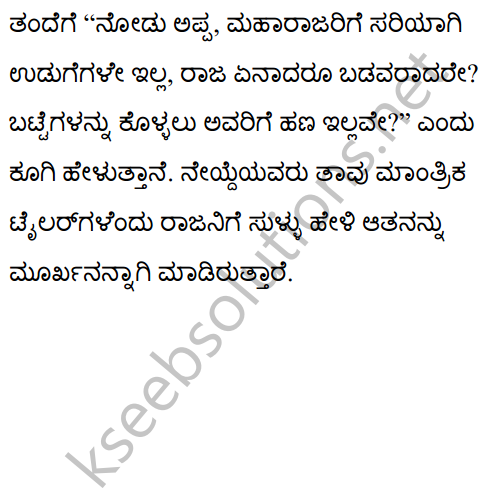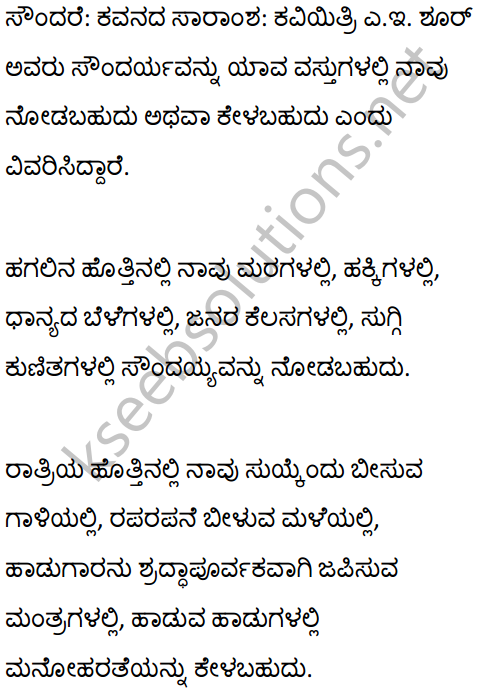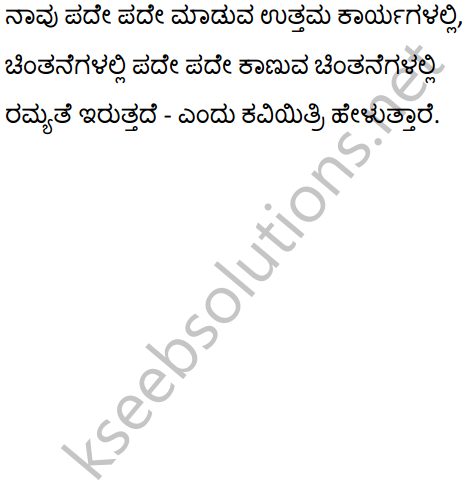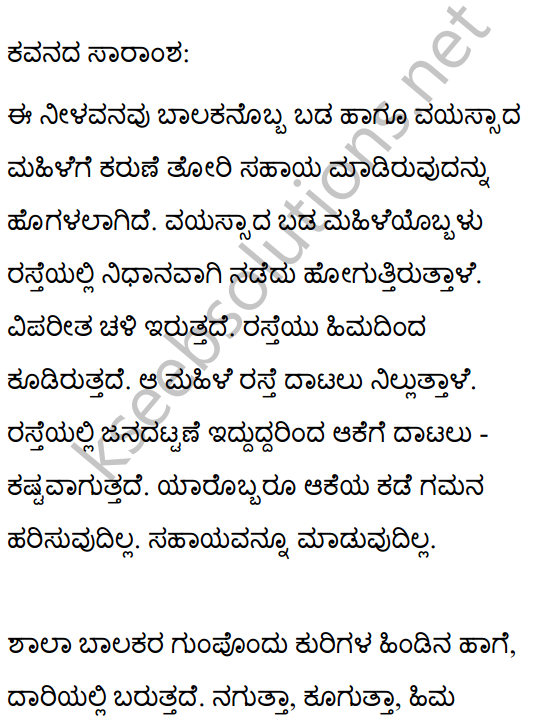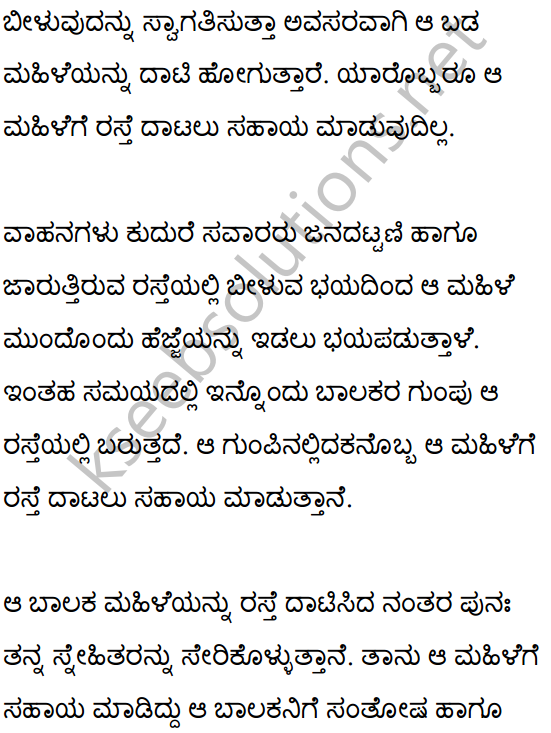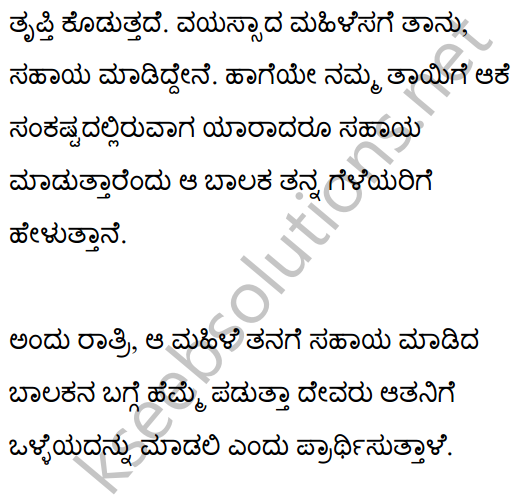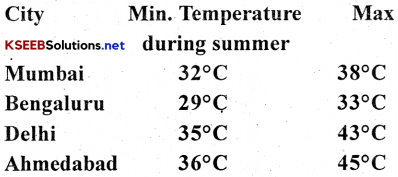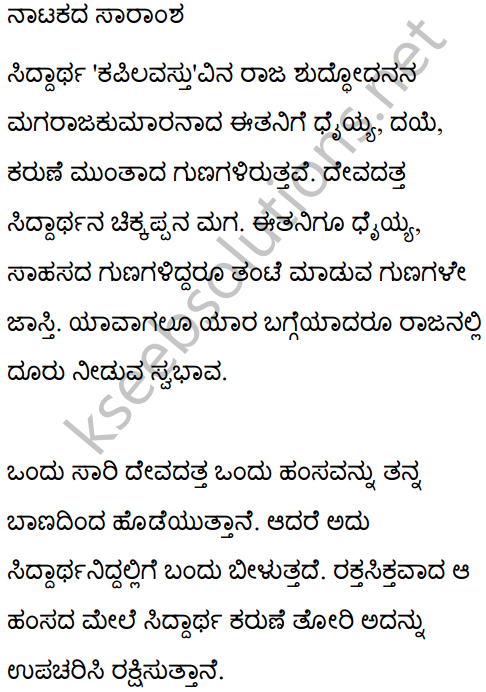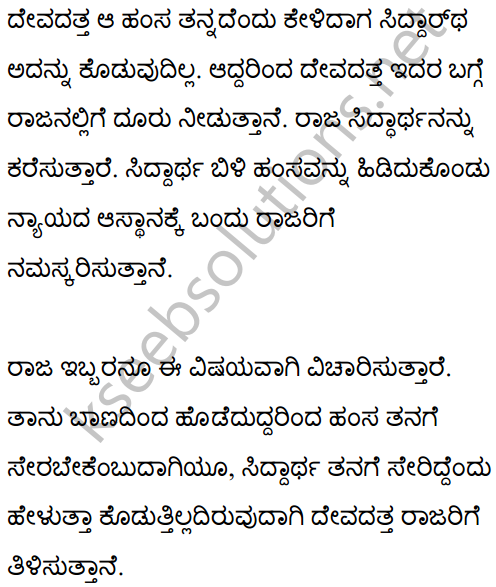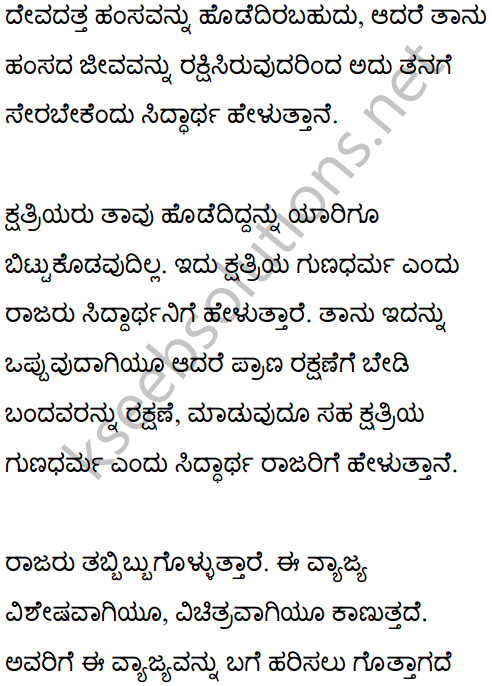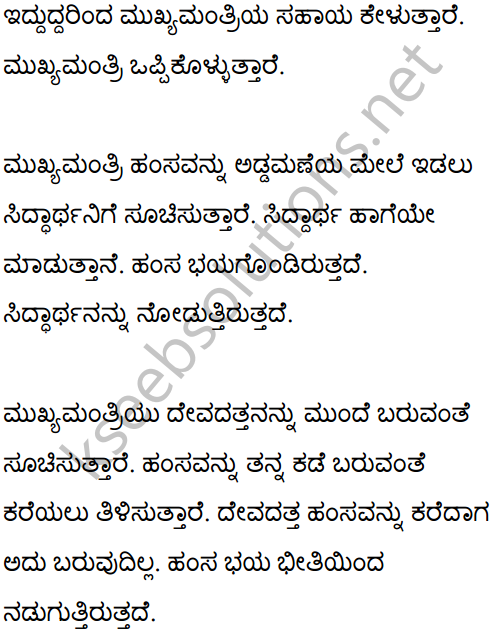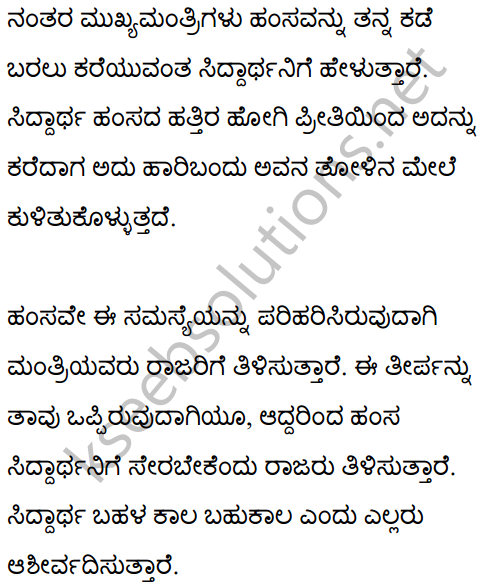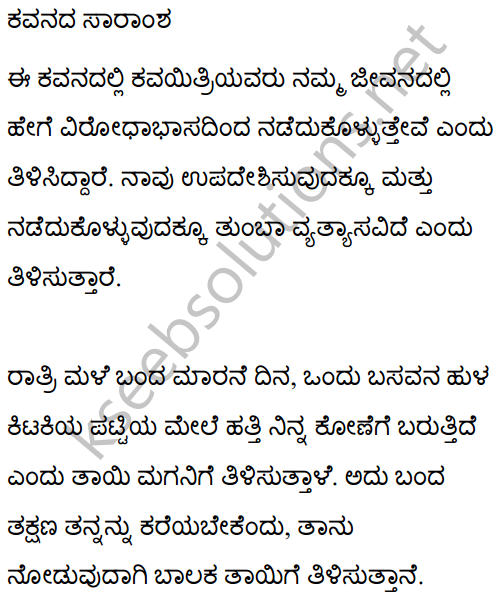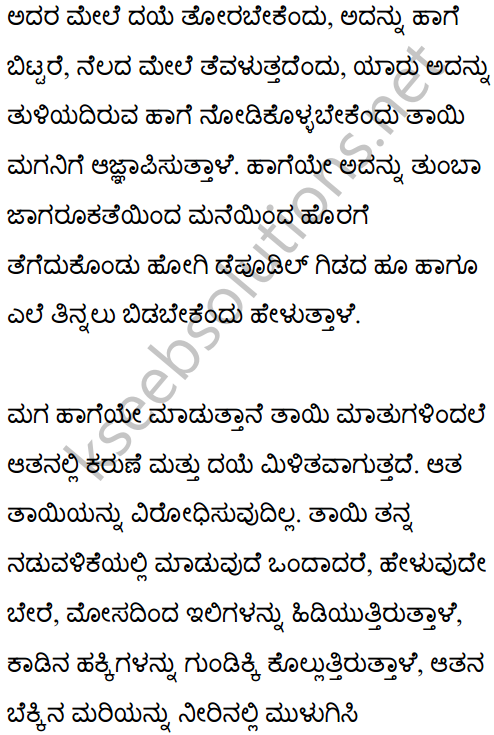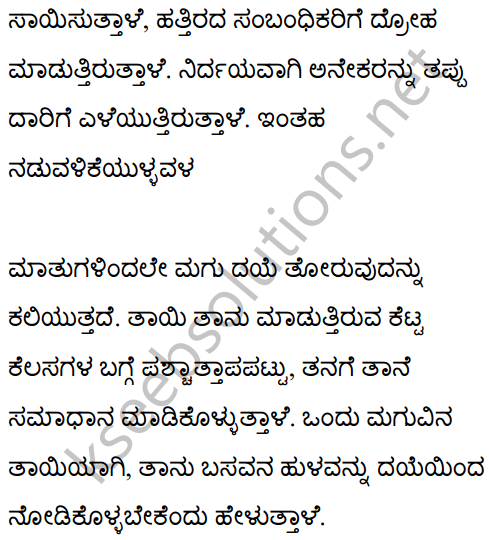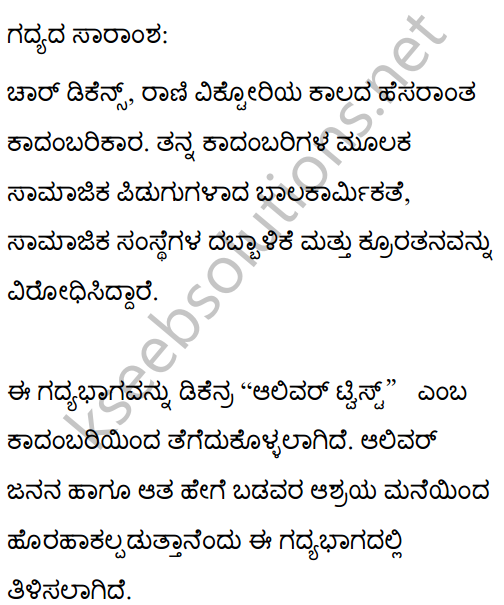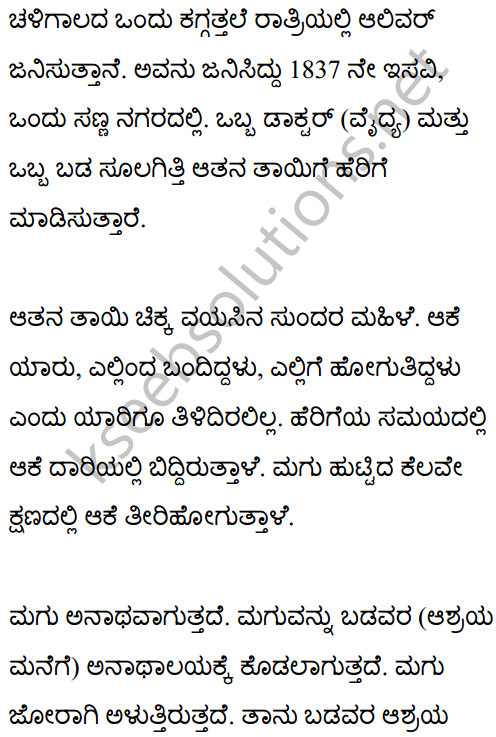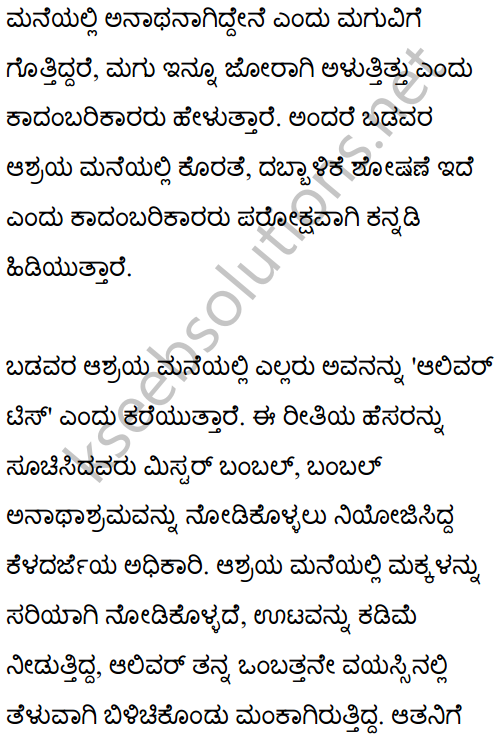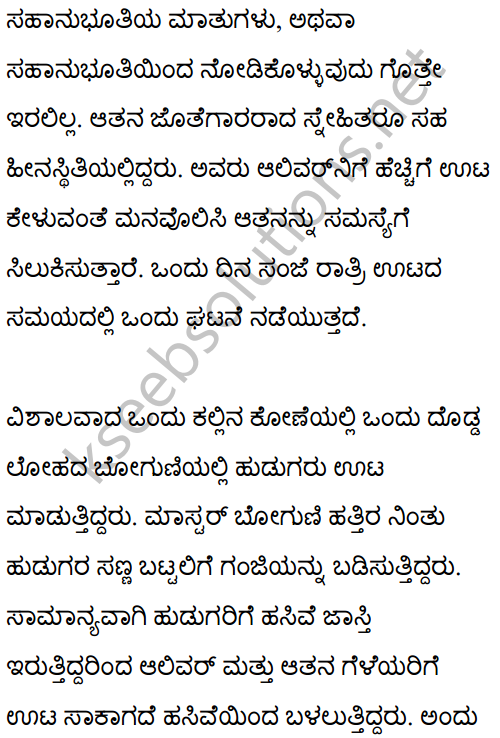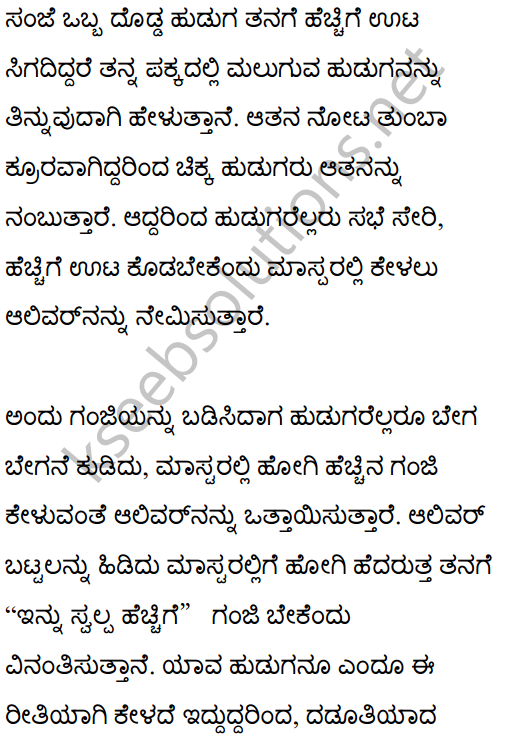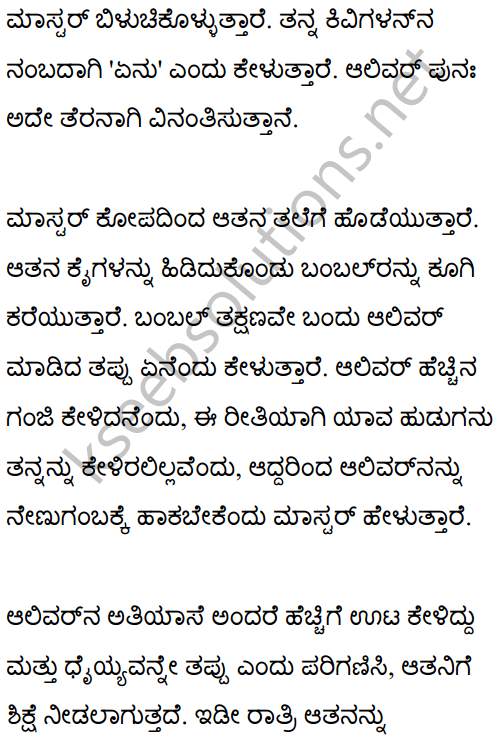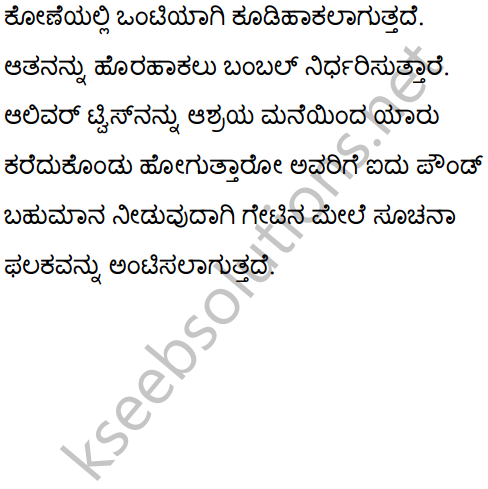KSEEB 8th English All The World Her Stage Lesson Notes Summary Questions and Answers
ILA. Fill in the columns after listening twice or thrice.
Answer:
| Desirable qualities | Undesirable qualities |
| 1. Kamala is friendly and polite. | 1. Maya is always late to school. |
| 2. Naina is social and generous. | 2. Mridula is jealous and lazy. |
| 3. Kamini helps the poor. | 3. Sowmya does not respect elders. |
| 4. Nandini works hard. | 4. Sudha talks and talks but never listens to others. |
| 5. Preeti is calm and quiet. | |
| 6. Janaki has sympathy for the poor. |
IRA. Read the following passage and answer the questions that follow.
Medha Patkar is a well-known name all over India, She was born on 1 December, ‘ 1954 in Mumbai. All her life has been devoted to social service, particularly for the upliftment of tribals. She started Narmada Bachao Andolan in 1985, to protest against the construction of the Narmada Dam across the river. Medha Patkar has won awards at the International level for her social work. These include ‘Right to Livelihood Award’ also called the Alternative Nobel Prize [Sweden, 1992], Goldman Environment Prize [USA 1993] and Green Ribbon Award [By BBC – 1995].
![]()
Fill in the blanks with the most appropriate alternative.
Question 1.
Medha is primarily a ………………
(a) a political activist.
(b) a social worker
(c) an organizer to fight gender discrimination.
Answer:
(b) social worker
Question 1.
Why did Medha Patkar set up Narmada Bachao Andolan?
Answer:
Medha Patkar set up the Narmada Bachao Andolan to protest against the construction of Narmada Dam across the river.
Question 2.
Name at least two countries other than India that recognised her service.
Answer:
Sweden and USA have recognised her services by awarding ‘Right to Livelihood award’ and ‘Goldman Environment Prize’.
Question 3.
Give a suitable title to the passage.
Answer:
The Lady who devoted her life to social services.
Textbook Questions and Answers
l. Answer the following questions:
Question 1.
Who was usually a playing companion for Sai in her childhood?
Answer:
Her grandfather was usually a playing companion for Sai in her childhood.
Question 2.
Who was affectionately called Appa?
Answer:
Her grandfather, R.P. Paranjpye was affectionately called as Appa by Sai.
![]()
Question 3.
When was the grandfather very much impressed by Sai’s ability?
Answer:
The grandfather was very much inpressed by Sai’s ability when she told her own fairy t tale to him. It was replete with dragons and princess, talking parrots and hidden gold.
Question 4.
What was Sai’s first published book?
Answer:
Mulancha Mera, a book of fairy tales was her first published book.
Question 5.
‘Sai froze’. When did this happen?
Answer:
One day, Sai stepped on a book by mistake as she rushed into the library. Her i grandfather ordered her to stop. ‘ Sai froze’ immediately.
II. Answer the following Questions:
Question 1.
How could Sai draw the attention of her playmates while they made fun of her?
Answer:
Sai drew the attention of her playmates by telling them a fantastic story.
![]()
Question 2.
What fascinated Sai as a child?
Answer:
Sai was always fascinated by many things. Doll’s wedding, a traditional game played by maharashtrian girls fascinated her the most.
Question 3.
Why is the word ‘mother’ given within the inverted commas in the sixteenth and seventeenth paragraphs?
Answer:
Sai played a role of a bride’s mother when she was young. She was fond of drama – and grew up to become one of India’s leading film makers and theatre personalities. She was not a real mother. She played a mother’s role and grew up to mother’s level in fdm making and drama. Hence the word mother is given within inverted commas.
III. Some Statements are given below. Some are true and some are false. Tick off ‘T’ or v ‘F’. Also, indicate in the box the paragraph number in which you can find your answer. Two examples are done for you.
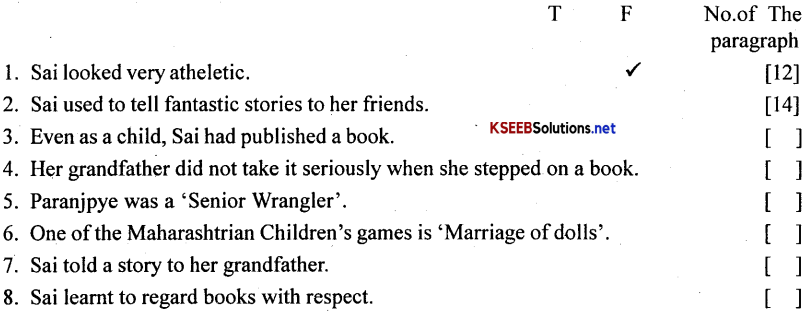
Answer:
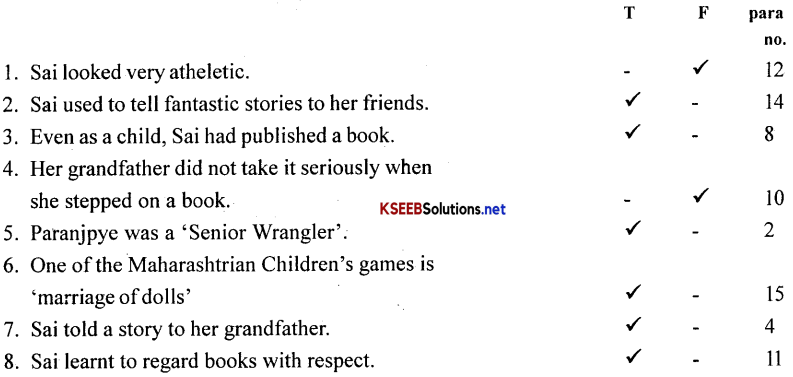
![]()
IV. Some important events in the story are given in a jumbled order. Put them in the order in which they are given in the text.
- Sai’s drawing the attention of the playmates,
- Grandfather telling her to treat books with respect.
- The usual sight of grandpa and Sai playing together.
- The wedding of dolls.
- Sai’s telling a story to her grandfather.
Answer:
The usual sight of grandpa and Sai playing together.
- Sai’s telling a story to her grandfather.
- Grandfather telling her to treat books with respect.
- Sai’s drawing the attention of the playmates.
- The wedding of dolls.
Read and Write.
V. Read and discuss your responses with your partner. Then write.
Question 1.
Describe how grandfather and Sai enjoyed each other’s company.
Answer:
Sai used to skip along with her grandfather every day. They laughed, talked and had a great time. As they walked, grandfather put simple mathematical questions, and also related fables to Sai. These included fairy tales, Arabian nights and Birbal’s stories. Sai naturally preferred the fairy tales to mathematical problems.
Question 2.
Why was grandfather very much impressed by Sai’s story?
Answer:
Sai told her own imaginative story to grandfather. It was a fairy tale, replete with dragons and princess, talking parrots and hidden gold. It was quite interesting. Hence, grandfather was very much impressed by Sai’s story.
Question 3.
What do you think was the great achievement of Sai as a child?
Answer:
At the age of eight Sai had published her first book of ‘Fairy tales’ called ‘Miilancha Mera’. It was her greatest achievement as a child.
Question 4.
Describe the incident in the library.
Answer:
Books were ‘revered’ objects in the Paranjpye household. One day, Sai stepped on a book by mistake as she rushed into the library. Her grandfather ordered her to stop. Sai froze. He told her that she had kicked knowledge and asked her to ask forgiveness of the book. Sai bent 1 meekly and did namaskar to the book.
Question 5.
How was Sai able to win over her friends?
Answer:
Sai was a bit plump and her friends used to make fun of her. They did not allow her to join them for the games. One day Sai sat and watching her friends laughing and playing happily. Soon, her face brightened. She cried out that she knew a lovely game, It was a ‘Magic island full of hidden treasure’. The playmates who were playing, gathered around her to listen to her story. In no time, she cast a spell of magic. They not only listened to the fantastic story, but were also ready to take roles and act as she directed. Like this, Sai was able to win over her friends.
![]()
Question 6.
What surprise awaited Sai one day as she came back from school?
Answer:
One day, Sai complained to her mother that she was not allowing her to have any fun. Her mother promised her to have fun that she could never forget.
On that day, when she came back from school, the whole house was decorated. It looked like a marriage hall. Before she could say anything, she was dressed like a bride’s ‘mother’. The band arrived, the, groom rode on a real horse. All the children of the locality took part. The ‘bride’ was brought with all religious chartings.
VI. Write a paragraph on each of the following topics. Do it in pairs. Prepare first, and final drafts. Then compare them with those of your partner.
Question 1.
Sai’s talents even as a child.
Answer:
Sai’ was a highly talented girl. She had the talent in telling her own imaginative stories. She had the capacity to create interest in others to listen to her stories. She told a fairy tale to her grand father. He was quite interested in her story and was very much impressed. She had the flight of fancy and wonderful world of creativity. At the age of eight she lad published her first book of fairy tales, called ‘Mulancha Mera’. She had the capacity to draw the attention of her playmates by telling fantastic stories. She was talented in directing her own imaginative stories which were being enacted.
Question 2.
Lessons she learnt from her grandfather.
Answer:
Books were ‘revered’ objects in the Paranjpye household. One day, Sai stepped on a book by mistake as she rushed into the library. Her grandfather ordered her to stop. Sai ‘froze’. He told her that she had kicked knowledge and ordered her to ask forgiveness of the book. Sai bent meekly and did namaskar to the book. The same punishment was given when he discovered any dog-eared book. With this, Sai learnt to respect books early in life. She got the power of imagination by listening to her grandfather’s stories.
Question 3.
The incident of the wedding of dolls.
Answer:
Sai was always fascinated by many things. One of them was doll’s wedding. This is a traditional game played by Maharashtrian girls. Children conduct ‘marriage’ of a bride doll and a groom doll. Mantras are chanted. (Gud-jaggery) and poha (beaten rice) are shared.
![]()
All The World Her Stage Lesson Vocabulary in English
VI. Fill in the blanks with the most appropriate word chosen from among the ones given in brackets.
Sai was 1 of telling stories. Her grandfather was 2 by this talent of hers. Though she was not 3 at sports, she used to 4 her friends with her 5 of fancy. Even as a child she had 6 a book of fairy 7
Answer:
(impressed, good, published, fond, flights, tales, entertain)
- fond,
- impressed
- good
- entertain
- flights
- published
- tales
V2. Some terms that describe people have been given below. Classify them under desirable and not so desirable categories. You may consult a good dictionary to help you doing this.
complaining, creative, imaginative, short- tempered, lazy, spirited, social, glum, jovial, innovative, lethargic, double-tongued, lax, jealous.
Answer:
| Desirable | not so desirable |
| Creative | jealous |
| imaginative | Short-tempered |
| spirited | Lazy |
| social | Lethargic |
| Innovative | Double-tongued |
| jovial | Complaining |
| lax | |
| glum |
V3. Give the antonyms of the following and use them in the blanks appropriately,
(short, fast, dim, beginning, young)
An 1 man appeared on the stage walking 2 at the 3 of the play, just before the close of the show. Soon, the audience stood up as the lights were switched on. In that 4 light, they could see the director, a 5 man with an imposing figure.
Answer:
short × tall
fast × slow
dim × bright
beginning × end
young × old.
- old,
- slowly
- end
- bright
- tall.
![]()
V4. Give the negative forms of these words using a prefix. Change the article if necessary.
e.g.,
| a familiar sight | an unfamiliar sight |
| a used towel | an unused towel |
| a prepared speech | an unprepared speech |
| an attentive soldier | an inattentive soldier |
| a successful attempt | an unsuccessful attempt |
| an organized show | a disorganized show |
| a satisfied person | a dissatisfied person |
A. Listen and speak
Diphthongs / el / al / /ɔɪ/
/al/ /el/ /ɔɪ/
high day voice
why shape _______
_______ _______ _______
Task 1. Teacher says the following words aloud. Repeat after the teacher. Write them in the appropriate columns.
void, sky, late, flight, made,
choice, nine, train, play, moisture,
boy, shine, place, plane, loiter.
Note: / al // el / and /ol / are called diphthongs, that is, combinations of two vowel sounds. You will learn more about diphthongs in your future lessons.
Answer:
| /al/ | /el/ | /ɔɪ/ |
| Sky | Late | Void |
| Flight | Made | Choice |
| Mine | Play | Moisture |
| shine | Place | Boy |
| plane | Loiter | |
| train |
Task 2. What vowel sound do these diphthongs, that is, / al // el / and /ɔɪ/ end with?
Answer:
These diphthongs end with the vowel sound of / I / :
Can you give more examples?
Work in pairs and check the pronunciation referring to a dictionary.
Answer:
/ al / : ice, sigh, mind, find, buy
/ el / : day, fate, age, page, say, way
/ɔɪ/ : toy, oil, poise, poison
![]()
B. Spoken English
Seeking Information
Situation-1 (Malik is a stranger in the city of Meerut. He seeks help first from Ramesh ” and then Chaturvedi)
Malik: Could you tell me where the Railway station is?
Ramesh: Sorry. I’m a stranger myself here.
Malik: That’s all right. Don’t worry, (he meets another person) Sorry for troubling you. Will you please tell me how to get to the railway station?
Chaturvedi: Well, can you see that? It’s Subhash circle.
Malik: Yes.
Chaturvedi: Go straight there. Take the first road on your left. Go past the post-office for about a hundred yards. You can see the station on your left.
Malik: Thank you very much.
Chaturvedi: Welcome.
Note: Seeking information can be done in several ways, depending on the situation and people whom you are requesting. Some patterns are:
1. Can you help me __________ please?
2. Do you happen to know __________ ?
3. Could you please tell me __________ ?
4. Do you mind if I __________ ?
5. I should be thankful to you if you could __________ ?
C. Reading
Reading for Information Task. Read the following piece of news and answer the questions.
Jahangir Khan, the legendary squash-player from Pakistan is considered to be the greatest player in the history of Squash. He won the World Open six times, and the British Open a record ten times. Between 1981 and 1986, he won 555 matches consecutively. This was not only the longest winning streak in squash history, but also one of the longest unbeaten runs by any athlete in any top-level professional sports.
Questions:
Question 1.
Who is Jahangir Khan?
Answer:
Jahangir Khan is the greatest squash player.
Question 2.
Which country does he belong to?
Answer:
He belongs to Pakistan.
Question 3.
Which game is he known for?
Answer:
He is known for squash.
Question 4.
How many times did he win the World Open?
Answer:
He won the World Open six times.
![]()
Question 5.
Which Open did he win ten times?
Answer:
He won the British Open ten times.
Question 6.
What was Jahangir’s achievement between 1981 and 1986?
Answer:
Between 1981 and 1986, he won 555 matches consecutively. This was the longest winning streak in squash history and one of the longest unbeaten runs by any athlete in any top level professional sports.
D. Grammar
Degrees of Comparison
Task 1. Read the sentences below the picture.

Task 2. Write the correct adjectives of comparison in the blanks below.
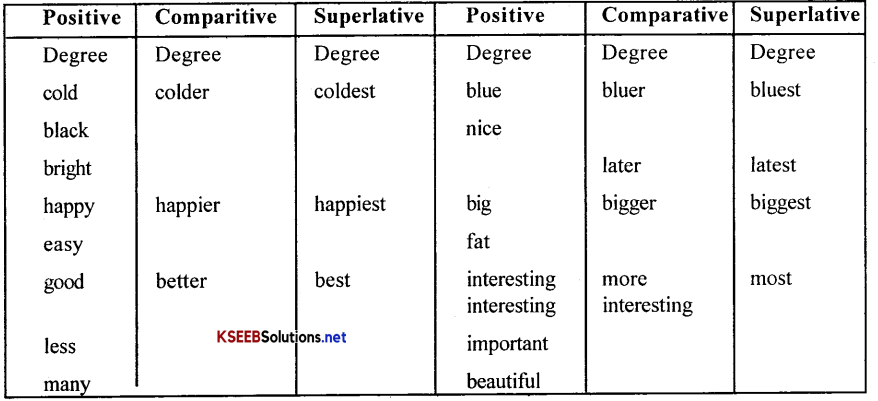
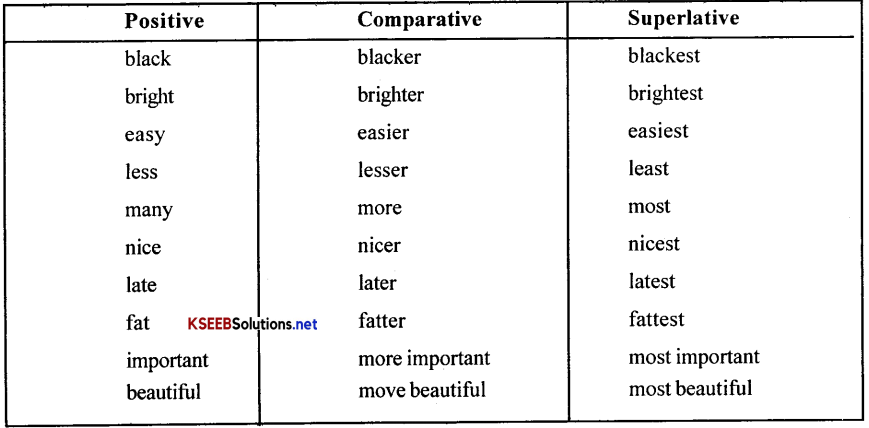
![]()
Task 3. Compare the given sets of nouns in pairs. Use the adjectives given in the box. Two are done for you.
Note: You have got to add appropriate articles in some cases.
| Nouns | Adjectives |
| gold, | cheap |
| masala puri, elephant | spicy |
| ice, water | |
| Chamundi hills, Mt. Everest tall | |
| mouse, white, rice | cool |
| aluminium | big |
- Aluminium is cheaper than gold.
- Gold is not as cheap as aluminium.
- Masala puri is spicier than white rice.
- White rice is not as spicy as masala puri.
- Elephant is bigger than mouse.
- Mouse is not as big as an elephant.
- Ice is cooler than water.
- Water is not as cool as ice.
- Water is not as cool as ice.
- Mount everest is taller than Chamundi hills.
- Chamundi hills is not as tall as Mt. Everest.
Task 4. Complete the following sentences using the given adjectives or their comparative/superlative forms.
Question 1.
great – Who, according to you, is the ________________ living poet of India?
Answer:
greatest
Question 2.
useful – Iron is the of all ________________ metals.
Answer:
most useful
Question 3.
useful – Iron is ________________ than any other metal.
Answer:
more useful
Question 4.
dry – Rajasthan is the _______________ part of India.
Answer:
driest
Question 5.
good – Health is always ________________ than wealth.
Answer:
better
![]()
Question 6.
good – Honesty is the ________________ policy.
Answer:
best
Question 7.
sharp – Your knife is not so ________________ as mine.
Answer:
sharp
Question 8.
tall – Ramesh is as ________________ as his father.
Answer:
tall
Question 9.
old – My sister is three years ________________ than me.
Answer:
older
Question 10.
heavy – May I help you? Your bag is ________________
Answer:
heavy
E. Writing
Descriptive Writing
Task 1. Describe the peacock in about ten sentences using the words given below.
(bird, national, beautiful, body blue, golden eyes, long green feathers, dance, blue eyes, eats – germs, worms, tender shoots of plants, live close to villages)

Answer:
Peacock is one of the most beautiful birds. It is our national bird. The body of the peacock is greenish blue in colour. It has golden eyes. It has long green feathers with blue eyes. When the peacock spreads its tail, the tail looks like a big colourful fan. The female peacock called a peahen and it is small and not so attractive without much. colourful feathers. Peacock dancing during rainy season is very beautiful. It eats – germs, worms and tender shoots of plants. It lives close to villages.
![]()
Task 2. Given below is a picture and some sentences describing it. Correct the description and rewrite the sentences so that they match the picture.
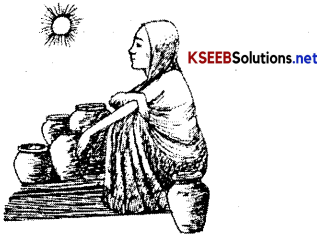
At the market, I saw an old woman sitting in a chair. She was selling eggs. She was wearing shirt and trousers. It was raining.
Answer:
At the market, I saw an old woman sitting on the ground. She was selling pots. She was wearing a saree. It was a sunny day.
Additional Questions with Answers
I. Four alternatives are given for each of the following questions/incomplete statement. Choose the correct alternative:
Question 1.
Sai Paranjpye was a famous:
a. Singer
b. dancer
c. theatre personality
d. player
Answer:
c. theatre personality
Question 2.
Sai’s Grandfather was a famous:
a. Doctor
b. Engineer
c. Astronomer
d. Mathematician
Answer:
d. Mathematician
Question 3.
Sai was calling her grandfather affectionately as :
a. dad
b. grandpa
c. Appa
d. Ajja
Answer:
c. Appa
Question 4.
Her grandfather was impressed by Sai’s
a. skipping
b. running
c. stories
d. Mathematical ability.
Answer:
c. stories
Question 5.
Sai had published her first book of fairy tales, called “Mulancha Mera” at the age of :
a. 4
b. 6
c. 8
d. 12
Answer:
c. 8
![]()
Question 6.
Sai’s playmates used to make fun of her and not allow her to join with them for the game because:
a. She was thin and weak
b. She was lazy
c. She was bit plump
d. She was very arrogant
Answer:
c. She was bit plump
Question 7.
Sai could draw attention of her playmates by:
a. Singing
b. Dancing
c. Telling fantastic stories
d. Telling jokes
Answer:
c. Telling fantastic stories
Question 8.
One of the things that fascinated Sai was:
a. horse’s wedding
b. Doll’s wedding
c. skipping
d. Mathematics
Answer:
b. Doll’s wedding
Question 9.
In the play of “wedding”. Sai played the role of:
a. groom’s mother
b. bride’s sister
c. bride’s mother
d. groom’s sister
Answer:
c. bride’s mother
Question 10.
Sai was always fascinated many things
a. on
b. to
c. by
d. of
Answer:
c. by
![]()
II. Answer the followings:
Question 1.
Who was Sir R.P. Paranjpye?
Answer:
R.P. Paranjpye Was a famous educationist and a mathematician. He was India’s first senior wrangler. He was Sai’s grandfather also.
Question 2.
Why did Sai’s playmates make fun of her?
Answer:
Sai’s playmates used to make fun of her because she was a bit plump.
Question 3.
What complaint did Sai make against her mother?
Answer:
Sal made a complaint that her mother was not allowing her to have fun.
Question 4.
What was shared among the children when they played the game of Doll’s wedding.
Answer:
Gud (Jaggery) and Poha (beaton rice) were shared.
Question 5.
Who was Sai Paranjpye?
Answer:
Sai panjaphye was one of the India’s leading filmmakers and theatre personalities.
III. Read the Extracts and answer the questions that follow.
Question 1.
“No, today you tell me one:
a. Who is the ‘me’ here?
Answer:
‘Me’ is R. P. Paranjpye, Sai’s grandfather.
b. Who is the ‘you’?
Answer:
‘You’ is Sai Paranjpye.
c. What did he want her to tell?
Answer:
He wanted her to tell him a story.
Question 2.
“Stop right there, Do you know what you Just did”?
a. Who Said this?
Answer:
Sai’s grandfather said this.
b. Who was it said to?
Answer:
It was said to Sai.
c. Why did he order her to stop?
Answer:
Sal had stepped on a book by mistake as she rushed into the library. So he ordered her to stop.
![]()
Question 3.
“You can’t run with us, you make our team weak”.
a. Who does ‘us’ refer?
Answer:
‘Us’ refers to Sai’s playmates.
b. Who does ‘you’ refer?
Answer:
‘You’ refers to Sai Paranjpye.
c. Why did they say so?
Answer:
Sai’s friends used to make fun of her because she was a bit plump.
Question 4.
“All right, you want a wedding? Well, you’ll’ have one that you can never forget”.
a. Who said this?
Answer:
Sai’s mother said this.
b. Why did she say?
Answer:
She said that because Sai was complaining that her mother was not allowing her to have fun.
c. What did she arrange later?
Answer:
Sai’s mother decorated the whole house like a marriage hall to play the drama “wedding”.
IV. Identify the parts of speech of the underlined words.
Question 1.
Sai’s grandfather was a famous mathematician.
Answer:
Adjective
Question 2.
“you can’t run with us, Sai”.
Answer:
Pronoun
Question 3.
Sai’s love for books grew with her.
Answer:
noun
![]()
Question 4.
Sai published her first book of fairy tale.
Answer:
verb
Question 5.
It was a fairy tale, replete with dragons and princess.
Answer:
preposition.
All The World Her Stage Lesson Summary in English
This is a short life sketch of Sai Paranjpye, a famous theatre personality from Pune, Maharashtra.
As a little girl, Sai used to call her grand father as Appa. Her grandfather was Sir R.P. Paranjpye. He was a famous educationist, and mathematician. He was India’s first Senior Wrangler. Every day young Sai used to skip along with her grandfather when he was on his walks. It was a common sight to the residents of Pune. In his walk, he used to ask her simple mathematical questions and tell her fables and fairy tales as well. Sai naturally preferred the fairy tales.
One day, Sai’s grandfather refused to tell her a story. But instead, he asked her to tell story. She told her own imaginative story. It was a fairy tale, replete with dragons and princes, talking parrots and hidden gold. Her grandfather was very much impressed with her story. That was perhaps her first flight of fancy, and it was the beginning of a wonderful world of creativity. At the age of eight, she had published her first book of fairy tales, called ‘Mulancha Mera’.
Sai’s love for books grew with her. Book were revered objects in the Paranjpye household. She learnt to respect the feelings about books early in life, from her grandfather.
Sai was a bit plump and so her playmates used to make fun of her. They did not allow her to join with them for games. But she used to draw their attention by telling them fantastic stories and made them to take roles and act as she directed.
Sai was always fascinated by many things. One of them was doll’s wedding. This is a traditional game played by Maharashtrian girls.
One day, she complained to her mother that she never allowed her to have any fun. That day, when she came back from school, the whole house looked like a marriage hall. A drama of ‘marriage’ was being arranged by her mother for fun. Sai played the role of Bride’s mother. The ‘mother’ that day, so fond of drama, grew up to become one of the India’s leading film makers and a theatre personality.
![]()
All The World Her Stage Lesson Summary in Kannada
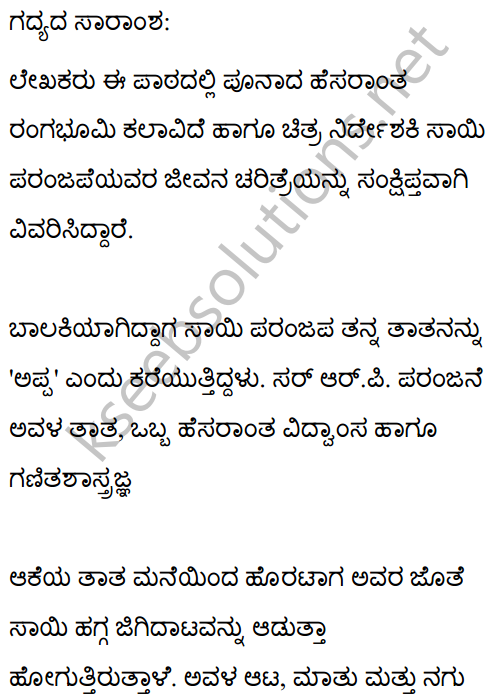
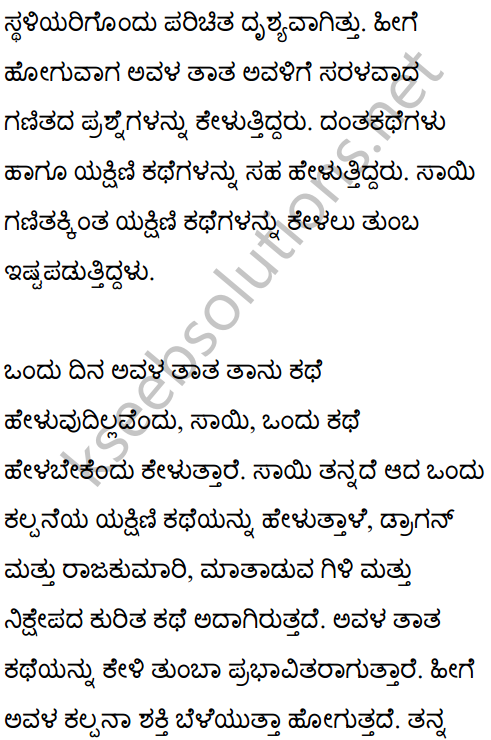
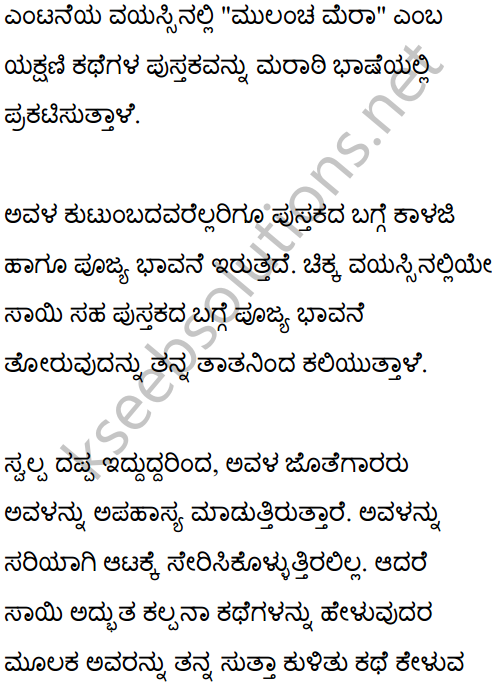
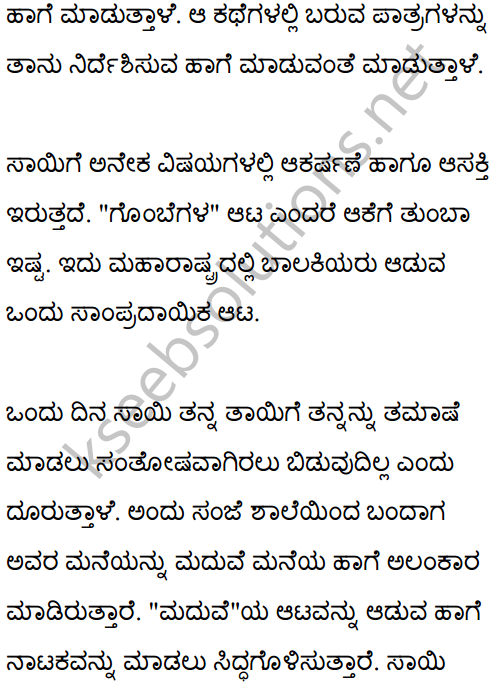
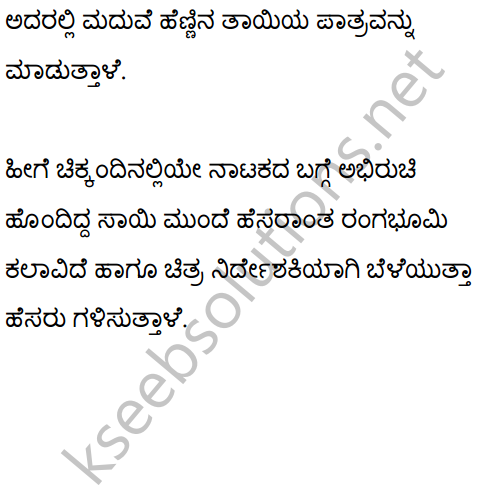
![]()
All The World Her Stage Lesson Word in English
- plump = round and fat
- fables = short stories not based on fact
- grimly = harshly
- replete with = full of, well stocked
- dragons = winged reptiles
- flights of fancy = wings of imagination
- publish = print in book farm and put into circulation
- grow = develop
- revered = treated with respect
- froze = p.t. of freeze – turned to ice
- fun = sport, amusement, jest
- jeered = mocked laughed at
- crumpled = press crushed
- glumly = gloomly with a sad face
- treasure = wealth
- fascinate = attract
- steed = riding horse
- bride = woman about to be married
- cast a spell of magic = told a story in such a way that listeners are attracted.
- traditional = being part of the customers of a particular group of people that has not changed for a long time ‘my favourite child’ or my dream child.
- Mulancha mera = a Marathi phrase meaning
- dog – eared = corners of pages of a book turned down or folded / tom due to a lot of handling
- senior wrangles = a person who tops in maths examination from Cambridge University.
- meekly = mildly; without protesting
- sidelines = areas just outside the playing area or arena.
- hidden = covered, not revealed
